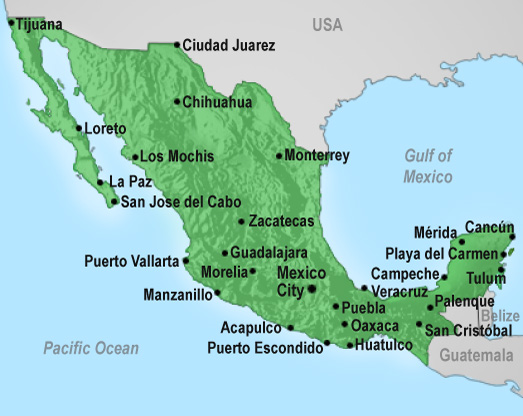 While we as Americans tend to see Mexico through our own eyes, e.g., immigration issues, etc. God sees much more!
While we as Americans tend to see Mexico through our own eyes, e.g., immigration issues, etc. God sees much more!
Mexico is roughly one quarter the size of the continental U.S. with a population of 120 million. It is more diverse than one might think. It is ethnically a mixture of indigenous peoples and Spanish colonial elements.
While 90% of Mexicans claim to be Catholic, only 10% attend church. Roman Catholics are very diverse, ranging from those involved in vital renewal movements (Charismatics) to syncretistic mixtures of Catholicism and pre-Catholic indigenous religious practices (spirit-ism and animism). Interestingly, the ALPHA course has had a positive impact among Mexican Catholics!
In addition to renewal movements among Catholics, there is a growing evangelical presence. While 1960 showed only 2% of the population as evangelical, they now account for about 9% of the total population. Charismatic-Pentecostals are responsible for much of that growth. People are hungry for something real – authentic relationship with God.
Life can be very difficult and many are locked into extreme poverty. For believers in some areas, persecution is a reality.
Politically for many decades the PRI party was the dominate force in Mexican governance. In more recent years, however, other political parties have been increasingly active. Corruption is rampant, like in many Latin nations.
YWAM Guadalajara is located in the central region of Mexico. Often called the “10/40 Window” of the Americas by Latino evangelicals, it is largely unreached, in some cases only 0.25% Christian. One area Assemblies of God missionary noted that this region is referred to as “The Heart of Darkness.” This picture is confirmed by the YWAMers who are at work there. There is a great need for leadership training, a mission vision and evangelical outreach. It is exciting for us to have even a small part in what God is seeking to do!
Mexico is a nation looking for a way forward and an identity. Pray for the Mexican believers to know God and have the courage to lead their people forward into God’s purpose for their nation.
Want more information about the world to which we are called? Check out: Operation World. Their website provides resources on every nation of the world and gives some helpful prayer points: http://www.operationworld.org/
Thoughts From Mexico
Our time in Guadalajara intensified the nearly overwhelming sense of the immensity of a world far from God and the question, “How can we possibly do what Jesus has asked of us?” Surrounding the YWAM base are multiple villages filled with essentially unreached peoples. In the Guadalajara region, even when there is a Christian presence in the form of Roman Catholicism, there is a great deal of superstition and error. Also, it can be dangerous in ways that Americans cannot fully appreciate.
In studying the book of Acts again, I was struck with how seemingly impossible the task Jesus gave to His disciples must have seemed to them. His own transformational mission, to proclaim God’s present (and coming) kingdom was now theirs. The first century world was a mess of confusion and brokenness – how could they possibly succeed? These early believers also had serious competitors; their religiously pluralistic environment world was filled with alternatives, each claiming to provide security, peace and “salvation” in a very dysfunctional world.[1]
Yet those early believers succeeded. Michael Green captures it:
It was a small group of eleven men whom Jesus commissioned to carry on his work, and bring the gospel to the whole world. They were not distinguished; they were not well educated; they had no influential backers. In their own nation they were nobodies and, in any case, their own nation was a mere second-class province on the eastern extremity of the Roman map. If they had stopped to weigh up the probabilities of succeeding in their mission, even granted their conviction that Jesus was alive and that his Spirit went with them to equip them for their task, their hearts must surely have sunk, so heavily were the odds weighted against them. How could they possibly succeed? And yet they did.[2]
Without question it was the Spirit who brought about their success. Yet, the Spirit acted with them; it was a full-on cooperative relationship! They were focused. Not on the impossibility of the task, but caught up with the wonder of the Jesus they knew so well. Their hearts captured by the person of Jesus, they could not help but be captivated by His purposes for the world around them. They lived out of a deep conviction that their lives mattered because of who He was – there was Someone worth living for and something worth doing and it was worth their whole lives. “Spoiled for the ordinary,” for them purpose and meaning could be found only in these things.[3]
Can we say the same? Unfortunately, we have lost this passion. We might be impressed by their passion, but can hardly believe such passion could or even should apply to us. We think passion of this kind was for some of the past Christian “heroes” whose stories we read in books, but all that seems irrelevant to our lives. We have so trivialized the gospel that the radicalness of it hardly solicits a yawn, let alone a reckless passion to give all. [4]
In our reflections on our mission, we must avoid the extremes of expecting too little or of trusting in our pragmatic “can-do-ism.” On the one hand, if we come to believe that our task is unrealistic and we despair, we will simply choose the easy road of lowering the bar of success. We will come to expect little and be satisfied with less. We may even turn to theologizing about it and blame God, “Whatever happens is what God wants to happen” or “Only God can change the world; leave it in His hands.” On the other hand, as good Americans, we might marshal our resources, plan and strategize and accomplish something, anything to show that we are busy with the task; and then pat ourselves on the back over our wonderful accomplishments – but have we done what God wants done?
Our call to passion is to live a convinced life,[5] fully engaged with God, dreaming the dreams of God. Faithful friends of Jesus are we to be![6] What the book of Acts lays before us seems straight forward enough. Live your life attentively; live “continually filled with the Holy Spirit” by which Paul means to live fully cooperative with the Spirit in all things.[7] It is to live radically dependent lives, fully engaged and fully responsive, fully faithful. It was and is a dangerous life, but one filled with the joy that only such a dependent life can bring.



